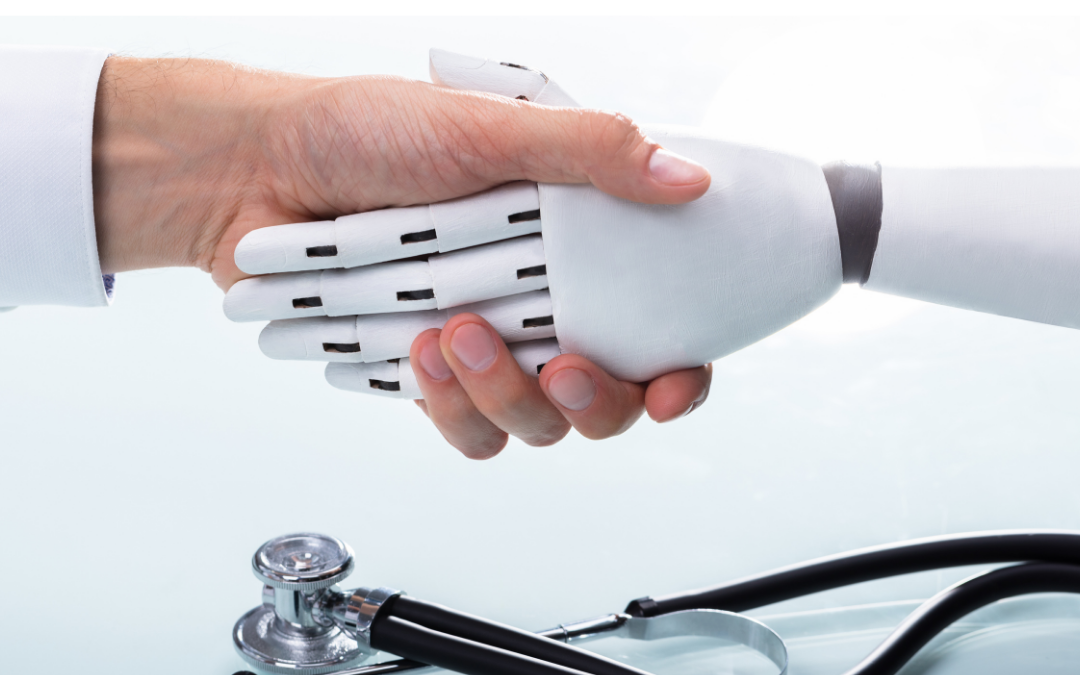If we were to tell you that, in the future, many medical processes will be automated, would you be scared or elated?
If you are scared, then you probably need us to elaborate on the exact kind of medical processes that AI is going to be helping with.
Do not worry, an automated pizza slicer is not going to be repurposed for your surgery, and you are not going to wake up from an anesthetic slumber to a cold steel robot of a doctor with a voice that sounds eerily like Alexa asking “Do you, PATIENT #5723919485, find your surgery satisfactory? Say YES for ‘yes,’ NO for ‘no,’ and WHAT HAPPENED TO MY LEG for ‘what happened to my leg.’”
Luckily, the aims of AI developers are much less ambitious than the creation of robot surgeons. However, do not take this to mean that their healthcare-related AI developments are not going to be game-changers in the medical world.
As it turns out, many of the projects already implemented, being trained, and still in early development or even being dreamt unpatented in the minds of students, are all going to make the jobs of healthcare professionals easier, making the experience of patients that much better. Keep reading to learn about some of the big advances being made in healthcare through AI.
Billing and Payment and Busywork Automation
Really, the big benefit that AI holds for healthcare is the automation of busywork tasks, such as filing and processing payments. Though some patients may become uneasy at the notion of a computer handling their money, the error rate of an AI agent is actually less than a human who needs to suffer through the minutiae of manual billing processes.
It is important to remember or realize that AI agents do not feel emotions like boredom, so they really can not conceive of any task set to them as being dull, which in turn means that there is no threat to AI making an oversight due to the dullness of a task.
Research, Records, and Natural Language Processing
Another example that illustrates this is AI’s use of natural language processing features to analyze troves of research. Most doctors are busy enough treating patients, making it difficult to keep up with the latest research. Though, of course, the most essential information is shared among doctors in most cases, AI can be useful for extracting relevant information from the barrage of medical research that is released every quarter, year, and beyond.
It is not just new research that AI can help with, either, as patient medical records can be scanned using the same natural language processing methods to extract vital information about a patient. Patient records can be endless, so having to search through the bulk of them for a few necessary tidbits can be punishing.
With machine learning technology, an AI agent can be assigned the task of answering a doctor’s specific question about a particular patient by scanning the patient’s records. What medication is this patient on? Has the patient had previous heart problems? Any allergies?
Drug Development and Deep Learning
Deep learning can be used to analyze scores of data from experiments to predict the potential effectiveness of different medicines for diseases. By doing this, costs are cut down on drug development and more appropriate prescriptions are recommended and filled for patients.
Being able to find new uses for existing drugs is a result of AI’s ability to form predictions from massive amounts of data no human could reasonably digest in a timely manner. Particularly, the ways a certain drug could be harmful to patients with certain conditions or using other medicines is one type of prediction that AI offers in medicine.
Emergency Calls and NLP
We mentioned natural language processing (NLP), which is a field dedicated to teaching AI agents how to understand languages like English and Spanish. Using NLP algorithms, an AI agent can listen in on a dispatcher’s emergency call with someone. While the dispatcher gets crucial information, the AI agent will pay attention to the verbal cues of certain conditions (sometimes a heart attack can be detected in non visual communication), further informed by quick background checks on the patient by searching medical records.
By the time the call is over, a diagnosis will be predicted and medical records will be analyzed, making the job of the EMTs easier as well as the doctor that the patient will be treated by. Not to mention helping the dispatcher in informing the actions that a patient ought to take while waiting for help to arrive.
Summary
The important thing to understand about AI and healthcare is that AI is being used to assist medical professionals, rather than replace them. It is probably true that the most crucial actions in medicine must always rely on human-to-human contact, rather than robot-to-human, so there’s no need to worry about getting triple bypass surgery from a doctor whose last name is SURGERY9000. However, you can be relieved that, thanks to AI, doctors will now have access to better predictions about which medicine is right for you, and that emergency dispatchers will know crucial information about you during the call.


Recent Comments